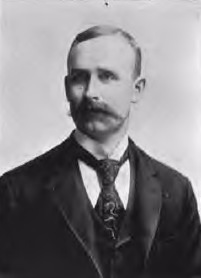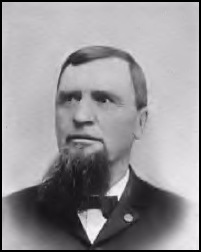|
Progressive Men
of
Iowa
1899
 FLINDT, William. Among the
representative business men of Spencer, none are
more worthy of mention in a work of this character
than William Flindt, who was born at Winona,
Minn., May 16, 1863. His father,
Claus H. Flindt, was a native of
Sleswick-Holstein, Germany. He came to this
country when a young man and soon after married
Anna Walburge Sipple, who was a native of Prussia.
They settled on a farm in Freeborn county, Minn.,
where, by industry and frugality, they managed to
amass a competency sufficient to enable them to
retire from active life, and they now reside at
Albert Lea, Minn., where Mr. Flindt assisted in
the organization of the First National bank of
that place and has always been one of the active
directors of that flourishing institution. FLINDT, William. Among the
representative business men of Spencer, none are
more worthy of mention in a work of this character
than William Flindt, who was born at Winona,
Minn., May 16, 1863. His father,
Claus H. Flindt, was a native of
Sleswick-Holstein, Germany. He came to this
country when a young man and soon after married
Anna Walburge Sipple, who was a native of Prussia.
They settled on a farm in Freeborn county, Minn.,
where, by industry and frugality, they managed to
amass a competency sufficient to enable them to
retire from active life, and they now reside at
Albert Lea, Minn., where Mr. Flindt assisted in
the organization of the First National bank of
that place and has always been one of the active
directors of that flourishing institution.
William lived with his
parents on the farm until he was 18 years old,
when he attended, for one year, the Albert Lea
high school, working for his board and working at
odd jobs between times to pay his way. After
leaving school he worked for a time in a grocery
store at $25 per month, and soon after engaged
with S.
Strauss, a leading clothier of Albert Lea,
where he worked for five years and thoroughly
learned the business. He came to Iowa September 1,
1887, locating at Spencer, where he opened up a
clothing store in partnership with his former
employer, S. Strauss, under the firm name of
Flindt & Strauss, the business being conducted
by Mr. Flindt, Mr. Strauss retaining his residence
in Albert Lea, Minn., where he was still engaged
in business. In 1891 they established a branch
store in Hartley, Iowa, which they sold a year
later. In 1894 they established a branch store at
Oelwein, Iowa, under the firm name of Flindt,
Strauss & Oleson, which they still own. In
1891 Mr. Flindt established a merchant tailoring
business in connection with his clothing store at
Spencer, but sold the same to L. Carlson one year
later. In 1896 he bought the interest of his
partner, Mr. Strauss, in the Spencer business, and
has since conducted it alone. He has been
remarkably successful in business and although he
is still a young man, has acquired a considerable
amount of this world's
goods.
Several years ago he
became a stock-holder in the First National bank
of Spencer, and was afterwards elected a director
of that institution. When the control of the bank
passed into other hands in January, 1897, he
resigned his position as director and associated
himself with others in the organization of the
Citizens State bank of Spencer, of which
institution he is a large stockholder and
director. He is also treasurer and director of the
Spencer Building and Loan association, and
treasurer and director of the Iowa Mercantile Fire
Insurance association, in the organization of
which he rendered considerable assistance in
1895.
He has always been a
zealous republican and has always taken a great
interest in politics, but has never been a
candidate for, or held, any public office, except
for a time a member of the city council of
Spencer.
He is a member of the Masonic Order,
holding membership in the Blue Lodge, Chapter,
Knights Templars and Eastern Star. He is also a
member of the subordinate Knights of Pythias lodge
and Uniform Rank. He has held a number of offices
in this organization, among them that of
chancellor commander. He does not belong to any
church, but usually attends the
Congregational.
He was married January
14, 1891, to Miss Emma M. Brundin, at Albert Lea,
Minn. They have three children, Lillian M.,
Charlotta Coline, and William Frederick, Jr. Mr.
Flindt is an energetic, wide-awake, progressive
businessman, public spirited and active in all the
affairs of his community. He takes a great
interest in everything intended to build up the
material and moral institutions of the city,
contributes liberally to all worthy objects, and
is a good example of a thorough and successful
business man.
 MADDEN, P. W. No state in the union has
had a penitentiary, warden more universally liked
by the unfortunates within prison walls, nor one
more popular with the general public than P. W.
Madden.
He was born in
New Castle, Pa., February 4, 1845. His parents
were natives of Pennsylvania, but beyond that fact
nothing definite is known of the family history. MADDEN, P. W. No state in the union has
had a penitentiary, warden more universally liked
by the unfortunates within prison walls, nor one
more popular with the general public than P. W.
Madden.
He was born in
New Castle, Pa., February 4, 1845. His parents
were natives of Pennsylvania, but beyond that fact
nothing definite is known of the family history.
He received but a
limited education in the public schools, being
early required to depend upon his own efforts for
a livelihood. His father died when he was 4 years
old, and he was therefore compelled to perform
manual labor to assist in the support of his
widowed mother. At the age of 10 years he came to
Iowa with his mother and settled in Mahaska
county, where they resided two years, then removed
to Polk county. Here he
worked on a farm for several years, placing in the
hands of his mother the greater part of his
earnings. It is related that when he first hired
to a farmer he was to get $10 for two months'
service hoeing corn. At the conclusion of the work
the farmer paid him with two five-dollar gold
pieces. The lad thought this poor compensation for
the amount of labor he had performed, and the more
he considered the matter the firmer became his
conviction that he had been cheated, never having
seen that kind of money, and it required the
repeated. assurances of his mother to convince him
otherwise.
In the spring of 1862,
at the age of 17, he enlisted in Company B,
Fifteenth United States regulars. His regiment was
sent to Newport barracks, when, after perfecting
itself in the drill, it was ordered to the front
and assigned to the Fourteenth Army corps, then
under command of General Thomas. The first fight
they participated in was the battle of
Chickamauga, where the Fourteenth corps held
Bragg's army in check after the defeat and retreat
of the other corps of the union army. The
Fourteenth performed heroic service on that day,
so dark and disastrous for Rosecrans' forces. The
regiment was under Grant at Lookout Mountain, and
with the center, under General Woods, scaled that
lofty range, hurled shot and shell, and poured
death and consternation into the ranks of the
rebels. From Chattanooga it marched with Sherman
to Atlanta, and when that city fell, it was
ordered back to Nashville. Besides Franklin and
Nashville it participated in the battles of
Missionary Ridge, Buzzard's Roost, Big Shanty,
Neal Dow Station, Resaca, Kenesaw Mountain, Peach
Tree Creek, New Hope Church, Jonesboro and the
siege of Atlanta. During his
entire service Mr. Madden never missed a roll
call. He was honorably discharged March 4, 1865.
Returning to Iowa he
remained in Des Moines for a time, then went to
Madison county, where he married. In 1870 he
removed to Clay county, took up a homestead and
commenced preparations for a permanent home.
Shortly thereafter the grasshoppers came. These
were years when it tried the nerve, ingenuity and
fortitude of the pioneers of northwestern Iowa.
But Mr. Madden was possessed of good staying
qualities and remained.
In 1879 he received the
nomination for sheriff, but was defeated by
eighteen votes. In 1881 he was again a candidate
and was elected by a majority of five. In 1883 he
was re-elected by a majority of 763 votes, and in
1885 by 832. He was again elected in 1887 and once
more in 1889. In 1891 there was no convention and
it was a "free for all " race, with four
candidates in the field. He was a winner this time
with many votes to spare. These repeated elections
attest the esteem in which he is held by the
citizens of his home
county.
Mr. Madden has served
three terms as warden of the state penitentiary at
Anamosa. So carefully and economically was that
institution conducted by him that at the beginning
of 1897 the management was able to operate a plant
which furnishes water for the entire institution,
and without one cent of additional cost to the
state.
It came out of savings from the support
fund, in addition to $30,000 turned back into the
state treasury during his first three years at the
head of the institution, and was accomplished
without curtailing in any measure the comfort and
table supplies of the prisoners. The new
improvement is estimated to be worth $20,000 to
the state.
He has now returned to his home at
Spencer.
He is a member of the
G. A. R., Odd Fellows and Knights of Pythias, in
all of which he is a leading spirit. He was
married September 20, 1868, to Miss Abigail
Hockett. They have had eight children, all but one
of whom are living.
The information
on Trails to the Past © Copyright may be used in personal family history research, with source citation. The pages in entirety may not be duplicated for publication in any fashion without the permission of the owner. Commercial use of any material on this site is not permitted. Please respect the wishes of those who have contributed their time and efforts to make this free site possible.~Thank you!
|